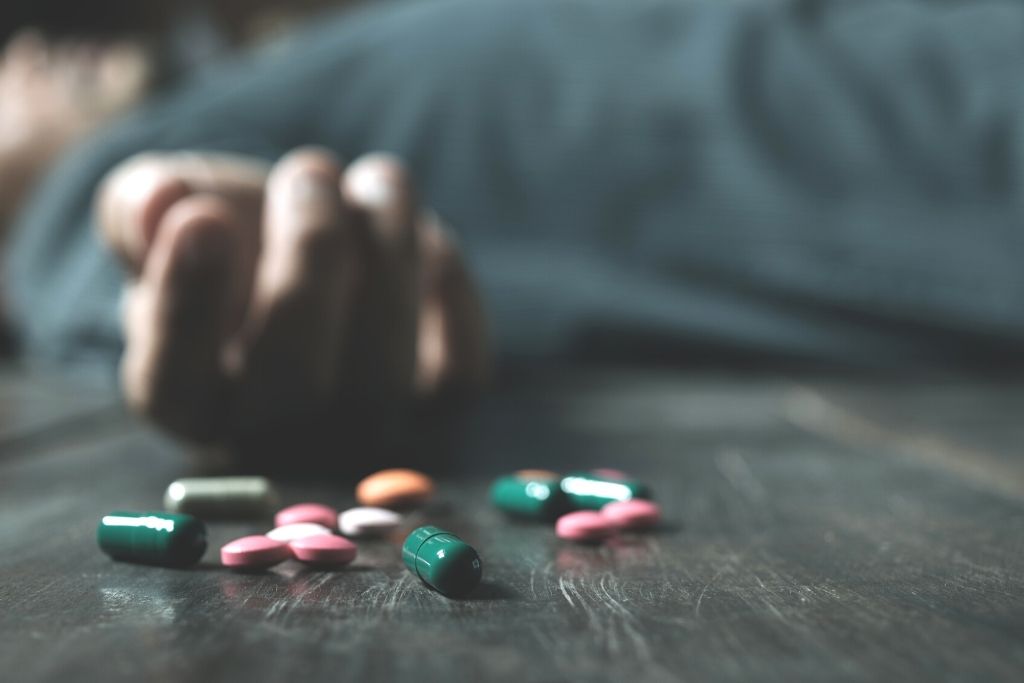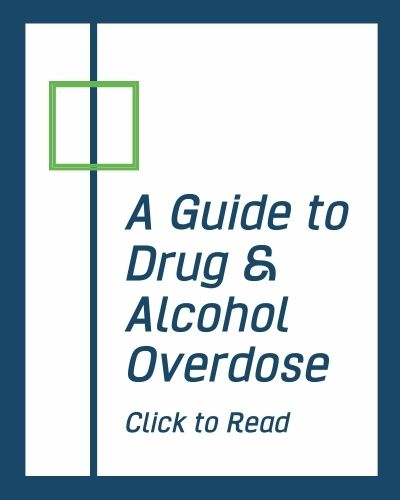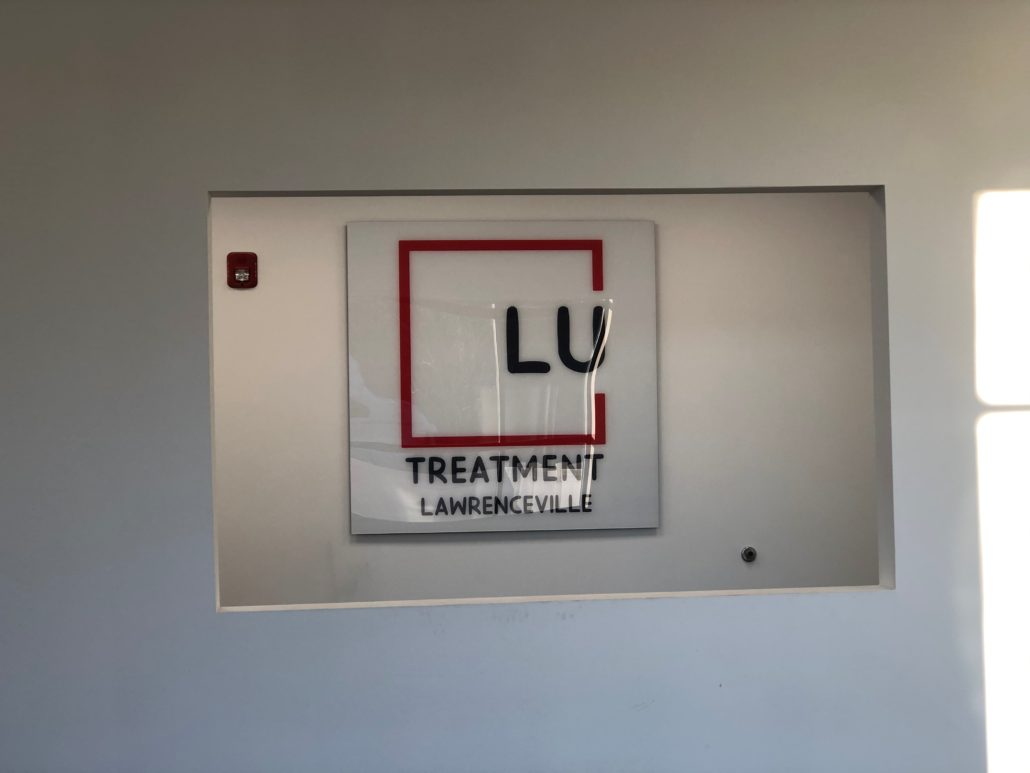What Is an Overdose?
An overdose is when someone takes more than the recommended or normal amount of drugs. It may result in severe, harmful drug overdose symptoms or death. Any drug overdose can be either accidental or intentional. If someone takes too many drugs on purpose, it is an intentional drug overdose. Intentional overdoses are usually a result of someone trying to commit suicide. If the drug overdose happens by mistake, it is called accidental. For example, a young child may accidentally take an adult’s heart medicine. Regardless of the intent, any loss of life due to an overdose is tragic, and an overdose can have lasting and severe repercussions.
According to the National Institute of Health (NIH) [1], an overdose is not the same as a poison, although the effects can be the same. Poisoning occurs when someone or something (such as the environment) exposes a person to dangerous chemicals, plants, or other harmful substances without the person’s knowledge.
An overdose may be mild, moderate, or serious. Drug overdose symptoms, treatment, and recovery depend on the specific drug concerned. A large overdose can cause an individual to stop breathing and die if not treated immediately. The individual may need to be admitted to the hospital to continue treatment. Multiple organs may be affected depending on the drug or drugs taken. This may affect the person’s outcome and chances of survival.
An overdose, sometimes referred to as OD for short, occurs when the body is overpowered by a toxic amount of substance or a combination of substances. It’s possible to experience drug overdose symptoms and overdose on a lot of things if abused, including drugs, alcohol, and even prescribed medication.


Get Your Life Back
Find Hope & Recovery. Get Safe Comfortable Detox, Addiction Rehab & Mental Health Dual Diagnosis High-Quality Care at the We Level Up Treatment Centers Network.
Hotline (877) 378-4154Drug Overdose Symptoms – Deaths
The US Centers for Disease Control and Prevention (CDC) [2] reported that Drug overdose deaths increased by close to 30% in the United States in 2020, beating the highest number ever recorded. More than 93,000 individuals died from drug overdoses in 2020. That’s a 29.4% increase from the 72,151 deaths projected for 2019.
The COVID-19 pandemic made a devastating collision of health crises in America. This is the highest number of overdose deaths recorded in 12 months, and the largest increase since 1999 [3]. Drug overdose deaths from synthetic opioids (primarily fentanyl) and psychostimulants such as methamphetamine (crystal meth) increased in 2020 compared to 2019. Cocaine overdose deaths also increased in 2020, as did deaths from natural and semi-synthetic opioids (such as prescription pain medication).
The year 2020 has been an incredibly stressful and uncertain time for many individuals and there has been an increase in drug use, problems in accessing life-saving treatments for substance use disorders, and a tragic increase in drug overdose deaths.
As the country continues to address both the COVID-19 pandemic and the opioid crisis, we must prioritize making treatment options more available to individuals with substance use disorders. But as the pandemic decreases, the country is still dealing with the alarming increase of overdose crisis. According to the National Center for Biotechnology Information (NCBI) [4], overdoses from opioids have been steadily worsening in the US for decades.
Purdue Pharma, the maker of the highly addictive painkiller OxyContin, was dissolved, in a wide-ranging bankruptcy settlement that will require the company’s owners, to turn over billions of dollars to address the deadly opioid epidemic. States will get money from a national opioid abatement trust, which they will distribute to their local governments. Doctors have also been blamed for overprescribing opioids and addicting people to them in the first place.
Drug Overdose Symptoms
Different drugs are linked with different overdose effects. Some signs of overdose for the following types of drugs include:
Drug overdose symptoms – Central nervous system (CNS) depressants:
- weak pulse
- shallow breathing
- clammy skin
- coma
- death from respiratory arrest
Drug Overdose Symptoms – Hallucinogens:
- Psychotic features
- Agitation
- Delirium
Drug Overdose Symptoms – Inhalants:
- Marked CNS depression
- Loss of consciousness
- Stupor or coma
- Arrhythmia
- Sudden death
Drug Overdose Symptoms – Marijuana:
- Profound drowsiness
- Unsteady gait
- Vomiting
- Tachycardia
- Agitation
- Psychosis
Drug Overdose Symptoms – Opioids:
- Depressed level of consciousness
- Respiratory depression,
- Clammy skin
- Cyanosis (bluish skin)
- Markedly constricted pupils (dilated if an anoxic brain injury has occurred)
Methamphetamine Overdose
One of the most significant physical dangers of abuse is a meth overdose. While a person can overdose the first time they take the drug, people who have used meth for long periods also face this risk.
Signs and symptoms of an overdose include:
- Abdominal cramps
- Confusion
- Convulsions
- Hallucinations
- Hyperthermia (dangerously high body temperature)
- Nausea and vomiting
- Panic
- Rapid breathing
- Restlessness
- Tremor
Drug Overdose Symptoms – Stimulants:
- Hyperthermia
- Tachycardia
- Hypertension
- Arrhythmia
- Agitation
- Hallucinations and other psychotic features
- Seizures
- Cardiovascular emergencies
Get Help. Get Better. Get Your Life Back.
Searching for Accredited Drug & Alcohol Rehab Centers Near You? Or Mental Health Support?
Even if you have failed previously, relapsed, or are in a difficult crisis, we stand ready to support you. Our trusted behavioral health specialists will not give up on you. Call us when you feel ready or want someone to speak to about therapy alternatives to change your life. Even if we cannot assist you, we will lead you wherever you can get support. There is no obligation. Call our hotline today.
FREE Addiction Hotline – Call 24/7Causes of Drug Overdose
Drug overdose may be:
- Accidental – if an individual takes the wrong substance or combination of substances in the wrong amount or at the wrong time without knowing that it could cause them harm. This may include individuals who take a drug to get a particular desired effect (for example to get ‘high’ or reduce unpleasant emotions), but don’t realize the strength of ingredients of what they’re taking.
- Intentional – a person takes an overdose to inflict self-harm (which may be a cry for help or a suicide attempt).
Sometimes it’s unclear if an overdose was accidental or intentional. There may be elements of both. It’s important not to judge people who have experienced an overdose and keep an open mind about the reasons.
Drug Overdose Symptoms for Specific Drugs
Duration of Drug Overdose
An individual may not exhibit all or even most drug overdose symptoms, and the length of time of the overdose may vary depending on other factors such as how the body responds, type of substance, the amount is taken, and how severe the overdose is. Even a few drug overdose symptoms can mean a person is experiencing an overdose. If this is the case, a person should take these drug overdose symptoms very seriously.
Drug Overdose Symptoms – Seizures
Recreational drugs abuse and overdose can cause seizures by indirect mechanisms, including cerebral trauma, CNS infection, and metabolic derangement. Some substances cause seizures more directly, either by direct toxicity or as a withdrawal phenomenon.
Seizures happen when there is a sudden, uncontrollable electrical surge in the brain. This abnormal activity between brain cells causes muscle movements, behavioral changes, and an altered state of awareness. There are several different types of seizures with a wide range of symptoms. This means that experiences and triggers vary from person to person. When a person has repeat seizures, they may be diagnosed with a disorder called epilepsy. Substances like alcohol and drugs can trigger seizures.
Those who struggle with a substance use disorder (SUD) may experience seizures as a result of drug use, overdose, or during treatment. Those who have been diagnosed with epilepsy could worsen their condition with the use of certain substances. Understanding the relationship between seizures and substance use is important to prevent future harm or incidents of seizures.

First-class Facilities & Amenities
World-class High-Quality Addiction & Mental Health Rehabilitation Treatment
Rehab Centers TourRenowned Addiction Centers. Serene Private Facilities. Inpatient rehab programs vary.
Addiction Helpline (877) 378-4154Proven recovery success experience, backed by a Team w/ History of:
15+
Years of Unified Experience
100s
5-Star Reviews Across Our Centers
10K
Recovery Success Stories Across Our Network
- Low Patient to Therapist Ratio
- Onsite Medical Detox Center
- Comprehensive Dual-Diagnosis Treatment
- Complimentary Family & Alumni Programs
- Coaching, Recovery & Personal Development Events
What are the risk factors for a drug overdose?
Risk factors for drug overdose are those that would make a person more likely to accidentally take the incorrect medication or take the wrong dose of a medication or more likely to abuse drugs.
Risk factors for accidental drug overdose include the following:
- Age: Young children and the elderly are at risk.
- Taking many different medications
- Mental illness
Risk factors for drug overdose in drug abusers include the following:
- Gender: Men are more likely to abuse drugs.
- Age: For example, people 45-54 years of age are more likely to abuse opioids, while people 25-34 years of age are more likely to abuse heroin.
- Low income
- Mental illness
- Using drugs alone
- High daily dosage of medications
- Doctor shopping
- Injection drug use
- Mixing alcohol with drugs
- Using multiple drugs
- History of overdose
- Use of street drugs
Preventing drug overdose symptoms
Drug overdoses can be prevented in many ways. The best methods remove possibilities for unexpected or accidental overdose or triggers for intentional overdose in the first place.
If you have children in the house, make sure that all medications, both over-the-counter and prescription, are kept well out of reach.
If you use prescription medications, be sure to use them only as directed by your doctor. Do not combine any medications without first asking your doctor if it’s safe. You should also not mix alcohol with prescription drugs without checking with your doctor first.
If you misuse drugs, quitting is the best way for you to prevent a drug overdose. Know that certain ways of taking drugs can be riskier than others. Injecting or inhaling drugs may cause them to get to your brain more quickly and also increase your chance of using an amount that can severely harm you.
If you feel like you can’t stop, talk to your doctor. There are many programs that can help you.
If you have suicidal thoughts or depression, contact your doctor right away. Your doctor can help you get the psychiatric care you need.
World-class, Accredited, 5-Star Reviewed, Effective Addiction & Mental Health Programs. Complete Behavioral Health Inpatient Rehab, Detox plus Co-occuring Disorders Therapy.
CALL (877) 378-4154End the Addiction Pain. End the Emotional Rollercoaster. Get Your Life Back. Start Drug, Alcohol & Dual Diagnosis Mental Health Treatment Now. Get Free No-obligation Guidance by Substance Abuse Specialists Who Understand Addiction & Mental Health Recovery & Know How to Help.
Drug Overdose Symptoms Treatment
Drug overdose treatment varies depending on the situation. Knowing how much of what drug was consumed can be extremely useful during treatment. Nevertheless, this information is not always available. General treatment methods that healthcare providers may use include:
- Clearing the airway or inserting a breathing tube when there is a problem with breathing
- Giving activated charcoal, which acts in the digestive tract to absorb the drug
- Inducing vomiting to remove the substance from the stomach
- Pumping the stomach to remove the substance from the stomach
- Giving intravenous fluids to help speed up the body’s removal of the substance
The healthcare provider may be able to use an antidote for certain drug overdoses. For example, the drug naloxone can help reverse the effects of a heroin overdose.
Find the Right Addiction Treatment at We Level Up NJ
Remember that being able to treat drug overdose symptoms at home is not a replacement for a hospital. Even if the moment has passed, and the victim seems fine, there is still a chance that something is going on that cannot be seen by the human eye. Taking the victim to the hospital can mean the difference between life and death.
Overdose is a scary word. We often associate it with death, but life can go on after an overdose. If you don’t know where that path begins, or need support for a loved one struggling with addiction, contact We Level Up NJ. We provide proper care with round-the-clock medical staff to assist your recovery. So, reclaim your life, call us to speak with one of our treatment specialists. Our counselors know what you are going through and will answer any of your questions.

Experience Transformative Recovery at the We Level Up Treatment Center.
See our authentic success stories. Get inspired. Get the help you deserve.



Start a New Life
Begin with a free call to an addiction & behavioral health treatment advisor. Learn more about our dual-diagnosis programs. The We Level Up treatment center network delivers various recovery programs at each treatment facility. Call to learn more.
- Personalized Care
- Caring Accountable Staff
- World-class Amenities
- Licensed & Accredited
- Renowned w/ 5-Star Reviews